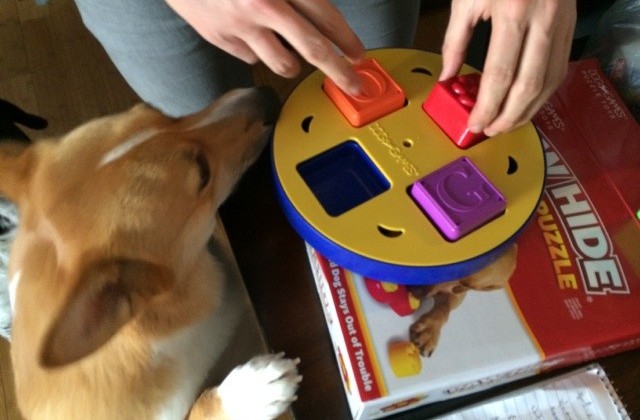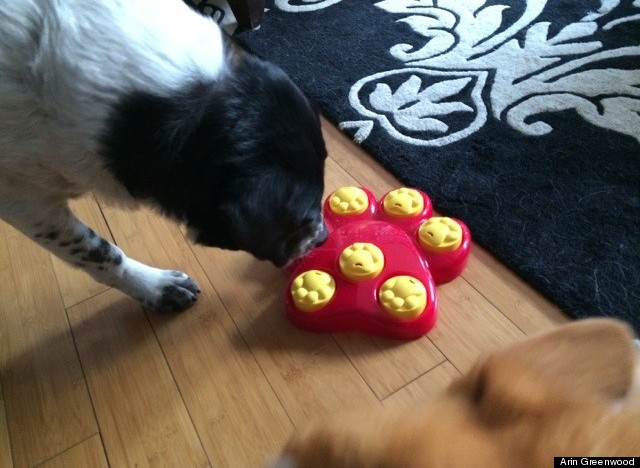My dog Murray is the sweetest mutt around. Is he the smartest? Hey look, there are games to test (and encourage) just that!
I was sent several of them to try out by Kyjen, a company that promises its products will challenge dogs, teach "step-by-step problem solving skills" and will also be an "interactive, positive, and fun experience."
First up: A toy called the Doggy Blocks Spinner. Getting it set up was a bit of a human intelligence test. But -- with the help of two friends, who are themselves very smart and whose corgi Bronson was participating, and their neighbor, whose rescue pup Amelia was along to experiment -- we finally wrangled four biscuits into the appropriate treat chambers, then put some plastic caps on top of that.

Bronson watching his owner set up the Doggy Blocks Spinner
The dogs were supposed to figure out about the hidden treats, tug the plastic caps off the biscuit receptacles with their teeth, then rotate a little wheel to reveal the biscuits. It hadn't occurred to anyone that the dogs might not then grasp the last step -- eating the biscuits -- until Murray began chewing on some of the plastic.
The adorable corgi, Bronson, was a quicker study. This wasn't a big surprise, since he is a bright and curious dog, who is exceptionally food-motivated to the degree that it is unsafe to leave anything that might be consumed on a surface less than eight feet off the ground.
Amelia, for her part, kept a respectful distance, being a little bit shy.
"What if we just pet you?" asked her owner, C., whose job dictates she can't have her name in print.
"You solved the problem of attracting our affection," said Rob, one of Bronson's owners, while eating cheese and crackers put out for the humans.
Next we pulled out the Paw Hide, similar to the first toy but with seven treat chambers and no rotation. Murray took a while to cotton onto this one, but once he did, he was again eager to chew up the plastic.

Murray with the Paw Hide
Bronson quickly devoured the treats, then dashed around the apartment looking for unattended cheese.
"He always 'sharks'," said Bronson's other owner, Joanna, a libertarian who explained proudly that her dog "finds the weakness in the system."
Amelia still quietly enjoyed some petting, while Murray looked slightly glum once the hard plastic was removed from his mouth. I probably looked slightly glum, too; no one likes finding out hard truths about their kid. Then it got worse. Perhaps inspired by all this new stimulation, Murray set his sights on humping Amelia. But he did that wrong, too, aiming his pelvis at her side. And anyway, both dogs are fixed.
Bronson was engaged in the third and most complex puzzle -- the Star Spinner -- which involves 10 treat chambers and a couple of star-shaped pieces of plastic. The corgi once again quickly intuited the quickest path to eating more food while Murray went for another wrong-sided stab at copulation with poor, patient Amelia.
We all agreed, after some more snacks and wine for ourselves, that it had been fun to play these new games with our dogs, and that we'd be likely to use them again. But we almost always enjoy playing with our dogs. Had the games been more than just fun?
Or, as Rob put it, the toys "exercise your mind, but what are you training us to do?"
This was the question I brought to Dr. Brian Hare, a professor at the Duke Institute for Brain Sciences and the co-founder (with his wife, Vanessa Woods) of a company called Dognition.
Dognition launched last year. It's a website that, for $29, takes users through a series of intelligence tests, to gauge your dog's mental facilities in what's described as "five cognitive dimensions": empathy, communication, cunning, memory and reasoning.
Wired had a pretty comprehensive look at the site when it began. Hare explained more recently to me that Dognition is sort of like a Myers-Briggs test for dogs, though with more of a cognitive focus.
As for the puzzles, Hare said he thinks their main purpose is just to be enjoyable (which they were) but poo pooed the notion that they will enhance or are good barometers of a dog's intelligence.
Speaking of: Many sources say dogs are about as a smart as a two- or three-year-old child; Hare says he prefers to measure the multiple varieties of dog intelligence than make that kind of blanket statement.
"In terms of the two dogs being different -- and that's your observation," he pointed out, addressing reports of my dog's lackluster performance on the puzzles as compared to Bronson. But then he got reassuring.
"For all you know," he continued, Murray "completely got it, understood all the solutions, and just thought it was dumb. So, it could be that the dog that played the game is not so smart, and the one that didn't is the smarter one. How could you ever know that?"
Perhaps, some would suggest, with data? Like the kind of data Hare's collecting on Dognition, with hundreds of people from all over the world testing their dogs in those five cognitive dimensions.
Bronson's parents scoffed when I sent them a link to Dognition. But Murray and I took the first series of tests, which measure empathy. First I had to yawn in front of him to see how he'd react. He didn't, but once I got started yawning I couldn't stop, so I had to lie down for a while. After that Dognition had me hold treats just under my eye for a while, to see how long Murray would maintain eye contact.
It turned out -- as the dog and I sat gazing at each other, me with a biscuit under my eye and Murray no doubt quite confused by this new behavior -- that he was willing to look me in the eye for over a minute at a time. Murray scored exceptionally high on the empathy test -- as high as a dog can score, actually -- meaning, according to Dognition, that he and I "have something special."
To which my husband, who is not impressed that Murray cries and cries when I close the bathroom door, replied, "You needed a test to tell you that?"
CORRECTION: A previous version of this piece said the price for Dognition is $60, which is the price for an upgraded membership.
